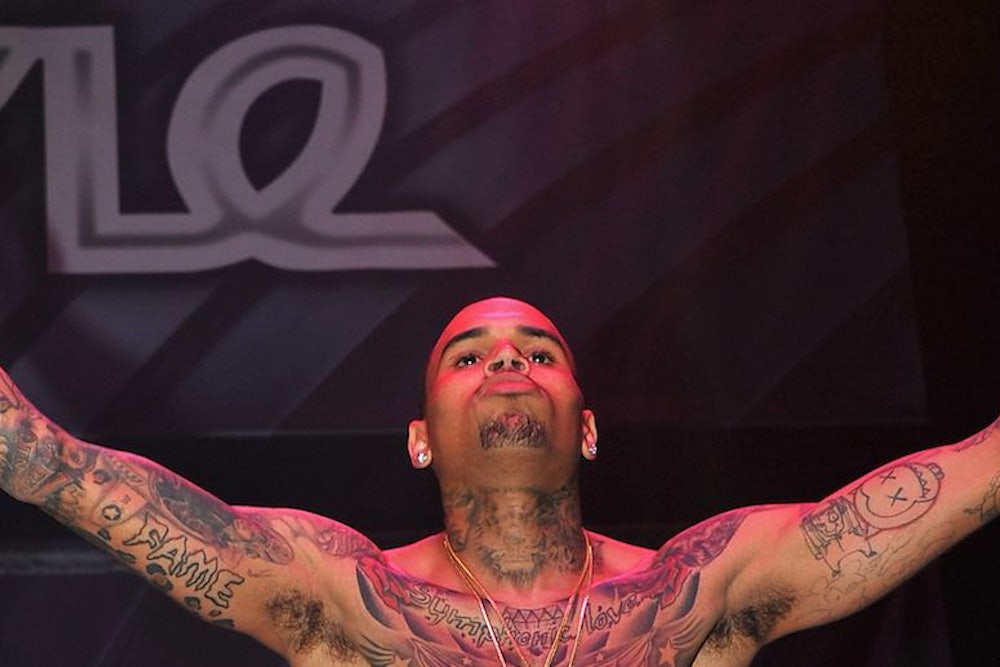On Tuesday, The Onion published a piece jarringly titled, “Heartbroken Chris Brown Always Thought Rihanna Was Woman He’d Beat To Death.” It’s a riff on "the one that got away" truism—only instead of wistfully saying that he always thought he’d have kids with her, an imagined Chris Brown laments all the abuse he never got to visit upon his ex: “Despite all the ups and downs, I was so sure Rihanna was the one I’d take by the throat one day and fatally assault, and even toward the end I continued to hold out hope that we’d be together until the day she died at my hands from blunt-force trauma.” Some Internet commentators, notably a hardcore of feminist bloggers, were aghast. In a representative tweet, an author at the blog Make Me a Sammich wrote, “You know what? In case it hasn’t been said often or loudly enough: #FUCKTHEONION.”
Readers of The Onion might have been surprised by the reaction. The grisly descriptions the piece offered of Rihanna’s abuse seemed par for the course, given the number of trigger warning–worthy Onion articles like “Pregnant Woman Relieved To Learn Her Rape Was Illegitimate,” “Nation's 10-Year-Old Boys: ‘If You See Someone Raping Us, Please Call The Police,’” and “Daniel Tosh Chuckles Through Own Violent Rape.” None of these, however, appeared to cause much controversy; in fact, some feminists found the latter one funny as hell. But these pieces were shielded by several layers of conceptuality. The first one, inspired by the Todd Akin controversy, described sexual assault in detail as awful as the Rihanna piece—“I’m so relieved to know that my child’s father, the man who muffled my screams as he forcefully penetrated me over and over and left me hemorrhaging to death on the street, is not a rapist”—but the victim, Martha Byars of Litchfield, Connecticut, was made up. Rihanna, and the photos of her bloodied face, are very real—and for writers like Jessica Valenti, that means that her circumstances should be off limits.
A few connected the article to a tweet The Onion put out on Oscar night about another woman of color, the 9-year-old Beasts of the Southern Wild actress Quvenzhané Wallis: “Everyone else seems afraid to say it, but that Quvenzhane Wallis is kind of a cunt, right?” After an uproar, Onion CEO Steve Hannah offered a rare apology on the site’s Facebook page. The two, though, are not really linked. The shtick of the tweet was that it applied a filthy expletive to the last person at the Oscars who could possibly "deserve" it—but there’s no point or punch line, and a joke that relies on the shock value of a curse word isn’t much of one. In his apology, Hannah nailed the problem. “It was crude and offensive,” he wrote, “inconsistent with The Onion’s commitment to parody and satire, however biting.”
The Onion piece on Chris Brown has a point: the humiliation of a domestic abuser. Yet many feminist bloggers have still interpreted the piece as being a shot at Rihanna, accusing its writers “of making sure Rihanna is mocked for being a survivor for the rest of her life.” (For her part, Valenti acknowledged that The Onion selected the right intended target, Brown.) “Instead of focusing on Chris Brown, The Onion’s target of the satirical piece was Rihanna,” Sophia Brugato wrote at Abortion Gang. But that is a dishonest reading of this piece. Nowhere does The Onion play Rihanna’s decision to reunite with Brown for yuks. If we’re being fair, it doesn’t even allude to it. Rihanna isn’t the target of this article, but the stand-in for "the one who got away" on which the whole joke turns. If she’s in this piece at all, it’s as a passive comedy device—and that is exactly the problem. Placing Chris Brown’s despicableness front and center meant turning a real person’s trauma into a cipher. The same thing that makes the piece so pitch-perfectly funny is what makes it so stomach-churning: There is no way to send up Chris Brown’s awfulness this incisively without making an object out of the person he brutalized.
Still, some think there is. “If The Onion was truly brilliant,” Brugato continued, “they would find a way to write satire about Chris Brown being an abusive boyfriend without typing one word describing another attack on Rihanna.” But to wish away Rihanna’s circumstances and pretend as though the girlfriend that Brown abused was imaginary would be to pretend that there is no real, living victim. That would be dishonest, and even more irresponsible than the original.
The best satire, in dealing with its target unsparingly, will occasionally do a disservice to victims. It’s a problem with no solution. You may shudder to think that the authors of this piece chose to make an object of Rihanna rather than dull the blow against Brown, and yet that's what made the piece funny. Valenti pegged the cost of lampooning Brown as too high. But besides writing something that disappears the victim altogether, the only alternative would be to not target Brown in the first place. And giving Chris Brown a pass because his crimes are too real and horrific—that would be the worst response of all.
Follow me on Twitter @mtredden
